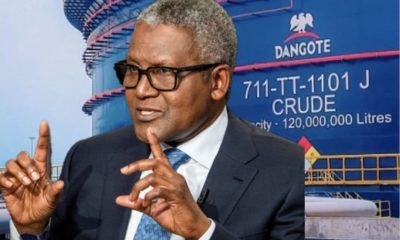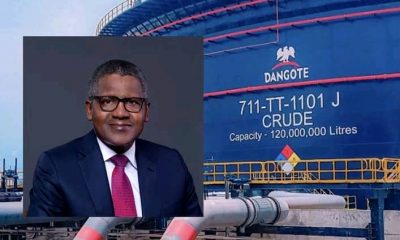society
Fueling Uncertainty: Investigating Nigeria’s Subsidy Removal And Dangote Refinery Debacle* By Sylvester Audu

*Fueling Uncertainty: Investigating Nigeria’s Subsidy Removal And Dangote Refinery Debacle*
By Sylvester Audu
*In the midst of dwindling revenues and skyrocketing subsidy costs, Nigeria has taken a bold step by removing fuel subsidies, igniting controversy and unrest among its population. Despite the opposition’s claims that subsidy removal will disproportionately affect the poor, the government’s redirection of funds towards crucial sectors such as health and education paints a promising picture for Nigeria’s future. The recent World Bank loan of almost a billion dollars for palliative measures may provide temporary relief, but it is not seen a sustainable solution*.
However, the fate of the much-anticipated Dangote Refinery, meant to reduce Nigeria’s reliance on imported petroleum products, remains uncertain as unforeseen technical difficulties delay its completion.
The Dangote Refinery, announced in 2013 with an initial $3.3bn loan deal with local and foreign banks to fund the construction, was expected to transform Nigeria’s reliance on imported petroleum products and boost the country’s economy. With an initial completion date of 2018, the refinery was planned to produce enough refined petroleum to meet domestic needs and provide a surplus for export. However, the project has been plagued by continuous delays, attributed to factors such as lack of technical expertise, financial constraints, and poor project scoping.
*Reports suggest that the Dangote Group is lobbying for an additional $3 billion cash injection, which could add to Nigeria’s debt burden and divert funds from more immediate solutions to the subsidy removal. Adding to the concerns surrounding the Dangote Refinery is the agreement between the Nigerian government and the Dangote Group. The Nigerian government in 2021 agreed to provide $2.7billion in cash-and-crude to the Dangote Group to fund the construction of the refinery in return for 20% equity. On December 1, 2021, the Federal Government through NNPC made a payment of $1.038billion in two tranches of $519.5million each to Lekki Refinery Funding Limited account with the beneficiary bank, representing the first cash portion of the deal, with the balance to be paid by the government upon completion of the project. This money was a loan from one of the international finance institutions to NNPC.*
*With the company missing out on interest payments due January 2023 of 750million dollars which is still yet to be paid despite being structured by the banks almost three times, the project is faced with a big dilemma – and with it, Nigeria’s hopes for the refinery.*
As it stands, there is evidence to suggest that the Company has exceeded its single obligor limit with local Nigerian banks and no international bank is willing to extend funds to it. In addition, the company will need at least 3 billion dollars in addition to its annual interest payments of about 700million dollars to complete the project by 2025. Whilst there are already talks for a backdoor arrangement being proposed with the CBN to enable a commercial bank circumvent its single obligor limit to the company in order for it to raise further cash for it to pay its interest obligation of 750million dollars which have fallen due, such a move has been viewed cautiously by supporters and critics of the project alike.
*These reports also suggest that the company unsuccessfully approached the outgoing president Muhammadu Buhari administration to release the remainder cash sum of 1.7billion dollars which was to have been paid upon completion of the project. According to these reports, President Buhari backtracked after further due diligence was done on the project which revealed that the project would not be completed before 2025 unlike the December 2022 date the company had promised at the time of signing the agreement*.
*As a result, intense pressure is now being mounted on the incoming government of Bola Tinubu to pay the remainder sum of $1.7billion dollars upon taking office as well as approve a new cash injection of 3billion dollars and crude for additional 20% equity in the project so the company can raise sufficient cash in the short term to pay outstanding interest costs and complete the project.* This is premised on the fact that the new government has declared it wants to plug revenue gaps by removing the subsidy but the company has now given them the impression that the project will be completed by mid-2024 – which is far from the case. The incoming government must therefore be wary of yet another such lofty promise by the project owners as sources close to the Chinese company brought in to salvage the refinery project say a 2024 date is not feasible.
Should the incoming government go this route, it does nothing to solve the problems with the completion of the refinery, adds further unnecessary debt burden to the country and its citizens, and takes away money from critical and immediate solutions to the subsidy removal. Nigeria is already over-leveraged to the Dangote refinery project.
Many commentators believe that rather than relying on the uncertain completion of the Dangote Refinery, the Nigerian government should focus on the ongoing refurbishing exercise of its existing refineries. This strategy would not only provide a more reliable short-term palliative solution but also pave the way for a smoother transition from imported petroleum products. They should also encourage the modular refineries to ramp up production.
In addition, the Nigerian government should explore alternative strategies, such as investing in renewable energy sources, to reduce the nation’s reliance on imported petroleum products. This approach would provide long-term benefits to Nigeria’s economy and environment, while also fostering self-sufficiency in fuel production.
*The removal of fuel subsidies offers Nigeria a unique opportunity to reassess its priorities and invest in a more sustainable future. By rejecting the new investment proposal for the Dangote refinery which has become an albatross whilst focusing on feasible alternative strategies, Nigeria can emerge stronger and more resilient in the face of global challenges. Can the incoming government afford to mortgage Nigeria’s scarce resources on a false hope? With billions of dollars and the country’s economy at stake, Nigeria cannot afford to pin all its hopes on the Dangote Refinery and even if the new government were to invest further in the project, there must be proper due diligence done before any investment is considered.*
society
Ramadan: Adron Homes Felicitates Muslims, Preaches Hope and Unity

Ramadan: Adron Homes Felicitates Muslims, Preaches Hope and Unity
Adron Homes & Properties Limited has congratulated Muslim faithful on the commencement of the holy month of Ramadan, urging Nigerians to embrace the virtues of sacrifice, discipline, and compassion that define the season.
In a statement made available to journalists, the company described Ramadan as a period of deep reflection, spiritual renewal, and strengthened devotion to faith and humanity.
According to the management, the holy month represents values that align with the organisation’s commitment to integrity, resilience, and community development.
“Ramadan is a time that teaches patience, generosity, and selflessness. As our Muslim customers and partners begin the fast, we pray that their sacrifices are accepted and that the season brings peace, joy, and renewed hope to their homes and the nation at large,” the statement read.
The firm reaffirmed its dedication to providing affordable and accessible housing solutions to Nigerians, noting that building homes goes beyond structures to creating environments where families can thrive.
Adron Homes further urged citizens to use the period to pray for national unity, economic stability, and sustainable growth.
It wished all Muslim faithful a spiritually fulfilling Ramadan.
Ramadan Mubarak.
society
Underfunding National Security: Envelope Budgeting Fails Nigeria’s Defence By George Omagbemi Sylvester

Underfunding National Security: Envelope Budgeting Fails Nigeria’s Defence
By George Omagbemi Sylvester | Published by saharaweeklyng.com
“Fiscal Rigidity in a Time of Crisis: Lawmakers Say Fixed Budget Ceilings Are Crippling Nigeria’s Fight Against Insurgency, Banditry, and Organized Crime.”
Nigeria’s legislature has issued a stark warning: the envelope budgeting system; a fiscal model that caps spending for ministries, departments, and agencies (MDAs) is inadequate to meet the country’s escalating security challenges. Lawmakers and budget analysts argue that rigid fiscal ceilings are undermining the nation’s ability to confront insurgency, banditry, kidnapping, separatist violence, oil theft and maritime insecurity.
The warning emerged during the 2026 budget defence session for the Office of the National Security Adviser (ONSA) at the National Assembly in Abuja. Senator Yahaya Abdullahi (APC‑Kebbi North), chairman of the Senate Committee on National Security and Intelligence, decried the envelope system, noting that security agencies “have been subject to the vagaries of the envelope system rather than to genuine needs and requirements.” The committee highlighted non-release or partial release of capital funds from previous budgets, which has hindered procurement, intelligence and operational capacity.
Nigeria faces a multi‑front security crisis: persistent insurgency in the North‑East, banditry and kidnappings across the North‑West and North‑Central, separatist tensions in the South‑East, and piracy affecting Niger Delta oil production. Despite declarations of a national security emergency by President Bola Tinubu, lawmakers point to a “disconnect” between rhetoric and the actual fiscal support for agencies tasked with enforcement.
Experts warn that security operations demand flexibility and rapid resource allocation. Dr. Amina Bello, a public finance specialist, said: “A static budget in a dynamic threat environment is like sending firefighters with water jugs to a forest fire. You need flexibility, not fixed ceilings, to adapt to unforeseen developments.”
The Permanent Secretary of Special Services at ONSA, Mohammed Sanusi, detailed operational consequences: irregular overhead releases, unfulfilled capital appropriations, and constrained foreign service funds. These fiscal constraints have weakened intelligence and covert units, hampering surveillance, cyber‑security, counter‑terrorism and intelligence sharing.
Delayed capital releases have stalled critical projects, including infrastructure upgrades and surveillance systems. Professor Kolawole Adeyemi, a governance expert, emphasized that “budgeting for security must allow for rapid reallocation in response to threats that move faster than political cycles. Envelope budgeting lacks this essential flexibility.”
While the National Assembly advocates fiscal discipline, lawmakers stress that security funding requires strategic responsiveness. Speaker Abbas Ibrahim underscored that security deserves “prominent and sustained attention” in the 2026 budget, balancing oversight with operational needs.
In response, the Senate committee plans to pursue reforms, including collaboration with the executive to restructure funding, explore supplementary budgets and ensure predictable and sufficient resources for security agencies. Experts warn that without reform, criminal networks will exploit these gaps, eroding public trust.
As one policy analyst summarized: “A nation declares a security emergency; but if its budget does not follow with real resources and oversight, the emergency remains rhetorical.” Nigeria’s debate over envelope budgeting is more than an accounting dispute; it is a contest over the nation’s security priorities and its commitment to safeguarding citizens.
society
Rev. Mother Kehinde Osoba (Eritosin) Celebrates as She Marks Her Birthday

Rev. Mother Kehinde Osoba (Eritosin) Celebrates as She Marks Her Birthday
Today, the world and the body of Christ rise in celebration of a rare vessel of honour, Rev. Mother Kehinde Osoba, fondly known as Eritosin, as she marks her birthday.
Born a special child with a divine mark of grace, Rev. Mother Eritosin’s journey in God’s vineyard spans several decades of steadfast service, spiritual depth, and undeniable impact. Those who know her closely describe her as a prophetess with a heart of gold — a woman whose calling is not worn as a title, but lived daily through compassion, discipline, humility, and unwavering faith.
From her early days in ministry, she has touched lives across communities, offering spiritual guidance, prophetic insight, and motherly counsel. Many testify that through her prayers and teachings, they encountered God in a deeply personal and transformative way. Near and far, her influence continues to echo — not only within church walls, but in homes, families, and destinies reshaped through her mentorship.
A mother in every sense of the word, Rev. Mother Kehinde Osoba embodies nurture and correction in equal measure. As a grandmother, she remains energetic in purpose — accommodating the wayward, embracing the rejected, and holding firmly to the belief that no soul is beyond redemption. Her life’s mission has remained consistent: to lead many to Christ and guide them into the light of a new beginning.
Deeply rooted within the C&S Unification, she stands tall as a spiritual pillar in the Cherubim and Seraphim Church globally. Her dedication to holiness, unity, and prophetic service has earned her widespread respect as a spiritual matriarch whose voice carries both authority and humility.
As she celebrates another year today, tributes continue to pour in from spiritual sons and daughters, church leaders, and admirers who see in her a living reflection of grace in action.
Prayer for Rev. Mother Kehinde Osoba (Eritosin)
May the Almighty God, who called you from birth and anointed you for His service, continually strengthen you with divine health and renewed vigour.
May your oil never run dry, and may your prophetic mantle grow heavier with greater glory.
May the lives you have nurtured rise to call you blessed.
May your latter years be greater than the former, filled with peace, honour, and the visible rewards of your labour in God’s vineyard.
May heaven continually back your prayers, and may your light shine brighter across nations.
Happy Birthday to a true Mother in Israel — Rev. Mother Kehinde Osoba (Eritosin).
More years.
More anointing.
More impact.
If you want this adapted for a newspaper page, church bulletin, Facebook post, or birthday flyer, just tell me the format and tone.
-

 celebrity radar - gossips6 months ago
celebrity radar - gossips6 months agoWhy Babangida’s Hilltop Home Became Nigeria’s Political “Mecca”
-

 society6 months ago
society6 months agoPower is a Loan, Not a Possession: The Sacred Duty of Planting People
-

 society5 months ago
society5 months agoReligion: Africa’s Oldest Weapon of Enslavement and the Forgotten Truth
-

 news6 months ago
news6 months agoTHE APPOINTMENT OF WASIU AYINDE BY THE FEDERAL GOVERNMENT AS AN AMBASSADOR SOUNDS EMBARRASSING












